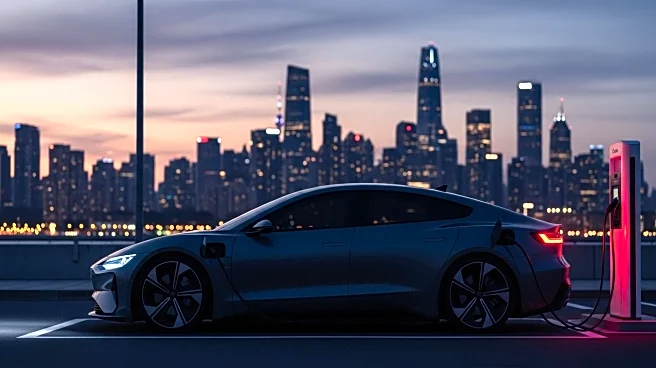What is the story about?
What's Happening?
Porsche has announced a delay in the rollout of some future electric vehicle (EV) models, a decision that parent company Volkswagen (VW) estimates will result in a $6 billion loss in forward profits. This move comes during a global surge in EV sales, particularly in regions like Germany and China, where Porsche's combustion model sales have declined. Despite the rise in electrified Porsche sales, the company plans to slow its EV rollout, opting to extend the availability of combustion engine models into the 2030s. Porsche CEO Oliver Blume cited massive changes in the automotive environment as a reason for this strategic shift.
Why It's Important?
Porsche's decision to delay its EV rollout amid increasing global demand for electric vehicles highlights the challenges traditional automakers face in adapting to rapidly changing market dynamics. The potential $6 billion loss underscores the financial risks associated with lagging behind in EV adoption. As Chinese automakers continue to dominate the EV market with competitive pricing and advanced technology, Western companies like Porsche risk losing market share and relevance. This strategic shift may impact Porsche's long-term competitiveness and its ability to meet evolving consumer preferences and regulatory standards.
What's Next?
Porsche's strategy to slow its EV rollout may lead to further financial implications and market positioning challenges. The company will need to navigate the competitive landscape, balancing its traditional combustion offerings with the growing demand for electric vehicles. Stakeholders will be closely monitoring Porsche's ability to innovate and adapt to industry trends, as well as its collaboration with VW and other partners. The automotive industry will continue to evolve, with regulatory pressures and consumer demand driving the shift towards sustainable transportation solutions.
Beyond the Headlines
Porsche's decision to delay its EV rollout raises questions about the ethical and environmental responsibilities of automakers in addressing climate change. As transportation remains a significant contributor to global emissions, the industry's commitment to sustainable practices is crucial. Porsche's reliance on combustion models may face scrutiny from environmental advocates and policymakers, potentially influencing public perception and regulatory actions. The company's strategic choices could have long-term implications for its brand image and its role in the transition to cleaner energy solutions.

















